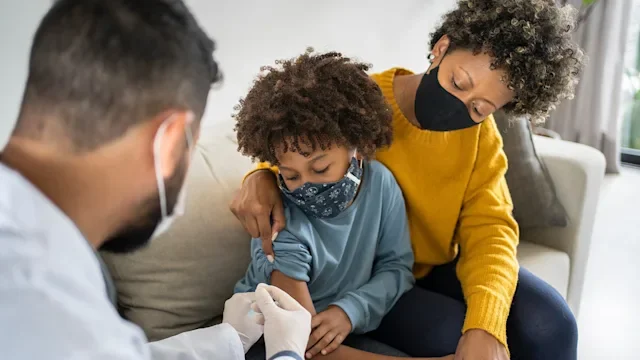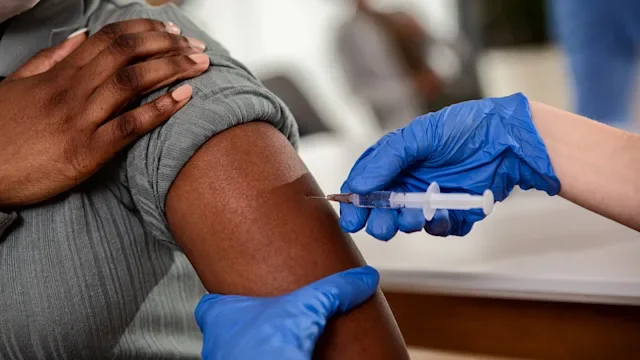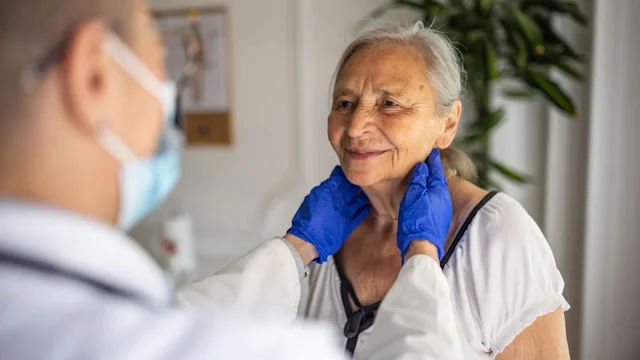Key takeaways:
It’s important to address vaccine hesitancy with your loved ones to help them feel comfortable getting vaccinated.
Misinformation about vaccines can contribute to their reluctance, but they can find credible information to answer their questions if they know where to look.
Remind them that getting vaccinated isn’t just about protecting themselves, but others in their community, too.
People have their reasons for becoming vaccine hesitant — some have legitimate concerns about having severe allergic reactions to vaccines, and others question their ability to protect us from disease. To make matters worse, it can be difficult to tell fact from fiction when it comes to vaccine information. This can cause more people to decide not to vaccinate after seeing or hearing something that isn’t true.
Vaccines work best when more people are vaccinated — protecting both you and those around you who are unable to take vaccines. Addressing vaccine hesitancy with your loved ones is important in making sure that they don’t get seriously sick, hospitalized, or die from a disease that could have been otherwise prevented.
If you know someone who is vaccine hesitant, there are things you can say to calm their fears.
Here we’ll look at five common concerns and how to address them.
1) Know where to get facts that you can trust
People have genuine questions and concerns about vaccines, and they deserve fact-based answers. But when you look for information about vaccines, it’s important to understand that everything you read or see isn’t necessarily true. There’s a lot of misinformation out there, riddled with scare tactics and fake data. Turn to credible sources such as government agencies, medical organizations and associations, and respected educational institutions, like those below.
Government agencies
Some people may hesitate turning to government sources for information, and that’s OK. There are plenty of other non-government entities that can answer your questions, too.
It’s important to note that the government involves other groups when making vaccine recommendations — they consult with experts and professional associations when determining which vaccines people should get and their specific schedules.
Examples of government agencies include:
Read more like this
Explore these related articles, suggested for readers like you.
Professional associations
These organizations exist to support people within a certain healthcare profession and to protect the public interest. They are typically nonprofit, meaning that they aren’t making money from their work. And while they aren’t government agencies, they do work with them to approve vaccine schedules for children and adults.
Examples of professional associations include:
Educational institutions
Many medical colleges and universities across the country raise funds specifically for vaccine research. These institutions develop and test vaccines for use in the U.S. and around the world to improve population health on a global scale. Most of their research funds come from government agencies and corporate sponsors.
Examples of educational institutions include:
If you come across a website or article that’s against vaccination, look for credentials, as well as any potential motives. If they’re promoting or selling a product (e.g., supplements) to be used in place of vaccines, be suspicious. While eating healthy and taking care of yourself is important in lowering your risk of getting sick, you’re probably looking at an unreliable source whose aim is profit, not public health safety.
2) You can still get the disease if you’re vaccinated, but you’re less likely to end up with severe illness
Yes, some people who get vaccinated still get sick. But it’s important to understand that you can’t get the disease from the vaccine. In some cases, you may have already been infected before getting vaccinated, or you weren’t fully protected by the vaccine at the time of exposure.
Keep in mind that no vaccine will prevent 100% of cases, so you may end up catching the bug even if you’ve been vaccinated. And factors like health and age may affect your level of protection, too. For example, older people who get the flu shot might still get the flu. But there are still plenty of reasons to get vaccinated, even if you get sick.
For example, studies show that vaccinated people lower their chances of getting seriously sick and, if hospitalized, spend less time in the hospital. Vaccination also lowers the risk of dying from the flu. Plus, vaccines can help prevent some of the long-term effects of an infection, like severe nerve pain that can develop after you’ve had shingles.
In other words, you’ll be far better prepared to handle the infection if you encounter the germ after you’ve been vaccinated against it.
3) Getting vaccinated not only protects you, but those around you
When a significant portion of a community is protected against a disease — either through vaccination or natural infection — it’s called herd immunity. Herd immunity makes it harder for diseases to spread from person to person, protecting those who can’t get vaccinated, like newborns, people with weakened immune systems, and those with severe allergies to vaccines. Vaccines are a more predictable and safe way to reach the level of immunity needed to protect a community.
But when people don’t vaccinate, we start to see outbreaks occur. An outbreak happens when enough people aren’t protected, allowing the disease to spread more easily in a community. For example, the World Health Organization has reported that measles, a preventable but serious childhood disease, has seen a 30% rise in cases. This includes some areas of the world where measles was nearly non-existent, but it has now made a comeback.
You’ve likely forgotten about many of the vaccine-preventable diseases because vaccines keep them under control. They’re still around, but they are contained because people following recommended vaccination schedules keep them that way.
4) Severe allergic vaccines can happen, but they are very rare
Know that it’s rare to have a severe allergic reaction to a vaccine. Severe reactions where you need medical attention (called anaphylaxis) may seem more common today, but it’s only because more people are getting vaccinated and reporting their reactions.
Data shows that people with certain types of allergies can still get vaccinated safely. For instance, people with egg allergies may hesitate to get the flu vaccine because it contains trace amounts of egg protein. However, a CDC study suggests that a severe reaction, in this case, is unlikely — about 1.31 cases of anaphylaxis per one million doses of the vaccine. But if you have a severe egg allergy, the CDC recommends getting vaccinated under the supervision of a healthcare provider in case you do need medical attention.
Ultimately, it’s best to discuss any questions, concerns, and history of any vaccine reactions with your healthcare provider so that you understand your vaccination options.
5) You should still get vaccinated even if you never get sick
You may be one of those people who rarely catches a cold or comes down with a stomach bug. You eat a healthy diet, exercise, and get plenty of sleep — all of which sets you up for a strong immune system. But even super healthy people can get sick and spread disease.
Vaccines help the immune system strengthen its defenses against invading germs. They help your body develop the antibodies it needs to fight infection. And although we think of older people with underlying conditions as those most likely to get critically sick, many of the preventable diseases can cause serious damage in young and healthy people, too.
As you work towards making your immune system as strong as it can be, think of vaccines as another tool in your healthy living arsenal.
The bottom line
You can address your loved one’s vaccine hesitancy by sharing facts with them. Start with the five topics discussed in this article and look for vaccine information from the reliable sources listed above. Remind them that vaccines don’t just protect individuals — they protect entire communities.

Why trust our experts?



















